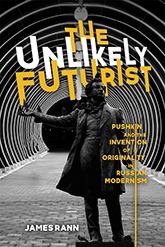|
The Unlikely Futurist
Pushkin and the Invention of Originality in Russian Modernism
James Rann
Publications of the Wisconsin Center for Pushkin Studies
David M. Bethea, Series Editor
“Elegantly written and convincingly argued. The Unlikely Futurist provides for the first time a comprehensive account of the complex relationship between Russian Futurism, on the one hand, and Pushkin and his myth, on the other.”
—Daria Khitrova, Harvard University
In the early twentieth centry, a group of writers banded together in Moscow to create purely original modes of expression. These avante-garde artists, known as the Futurists, distinguished themselves by mastering the art of the scandal and making shocking denunciations of beloved icons. With publications such as "A Slap in the Face of Public Taste," they suggested that Aleksandr Pushkin, the founder of Russian literature, be tossed off the side of their "steamship of modernity."
Through systematic and detailed readings of Futurist texts, James Rann offers the first book-length study of the tensions between the outspoken literary group and the great national poet. He observes how those in the movement engaged with and invented a new Pushkin, who by turns became a founding father to rebel against, a source of inspiration to draw from, a prophet foreseeing the future, and a monument to revive.
Rann's analysis contributes to the understanding of both the Futurists and Pushkin's complex legacy. The Unlikely Futurist will appeal broadly to scholars of Slavic studies, especially those interested in literature and modernism.
 James Rann is a lecturer at the University of Glasgow.
James Rann is a lecturer at the University of Glasgow.
Praise
“An extremely intelligent, well-polished study of Russian Futurism's treatment of Pushkin as both as historical burden to be thrown from the 'steamship of modernity' and a source of inspiration for the Futurist, avant-garde project of reinvigorating Russian and Soviet poetry. The Unlikely Futurist dazzles.”
—Tim Harte, Bryn Mawr College
“An important contribution to the study of Russian Futurism, which goes much beyond the analysis of the works of individual writers to situate the movement both within the Russian literary and artistic culture of the early twentieth century and to contextualize it theoretically within European modernism as a whole.”
—Australian Slavonic and East European Studies Journal
Of Related Interest
|

Citizen Countess:
Sofia Panina and the Fate of Revolutionary Russia
Adele Lindenmeyr |

An Anti-Bolshevik Alernative:
The White Movement and the Civil War in the Russian North
Liudmila Novikova, Translated by Seth Bernstein |
|

Larger images
July 2020
LC: 2019041252 PG
280 pp. 6 x 9
|

